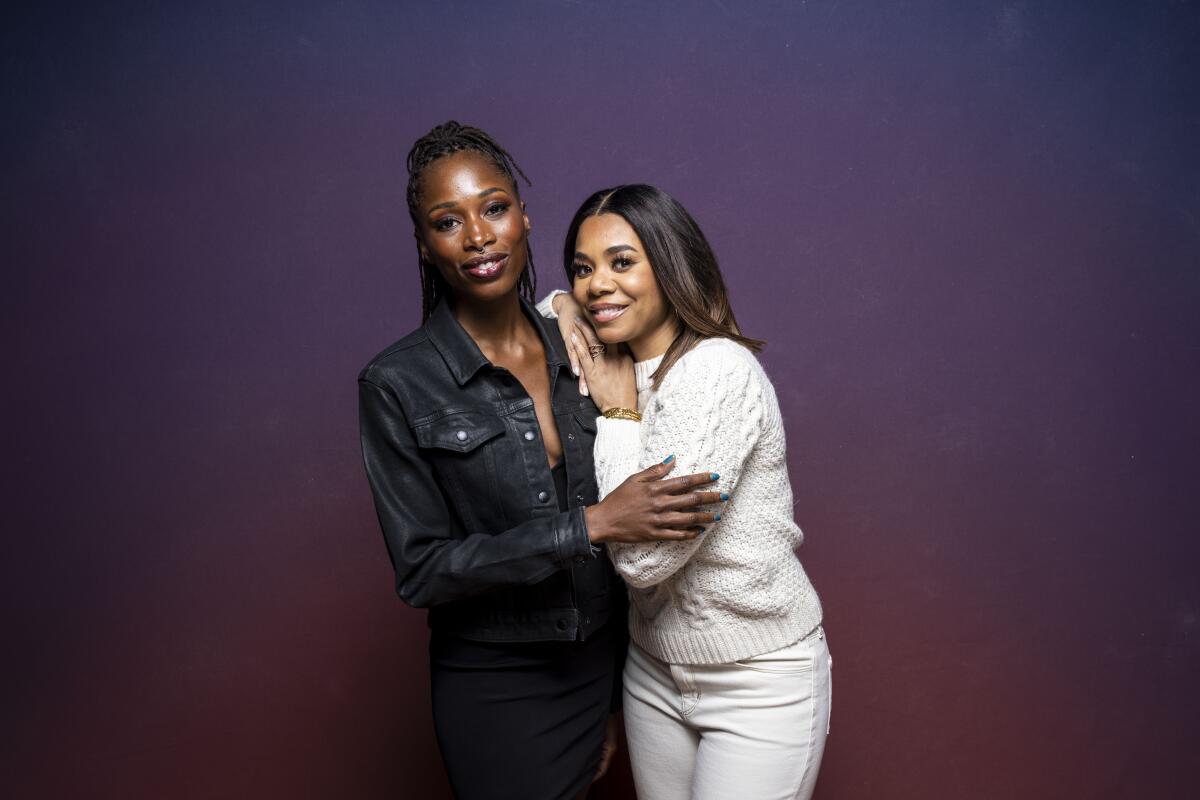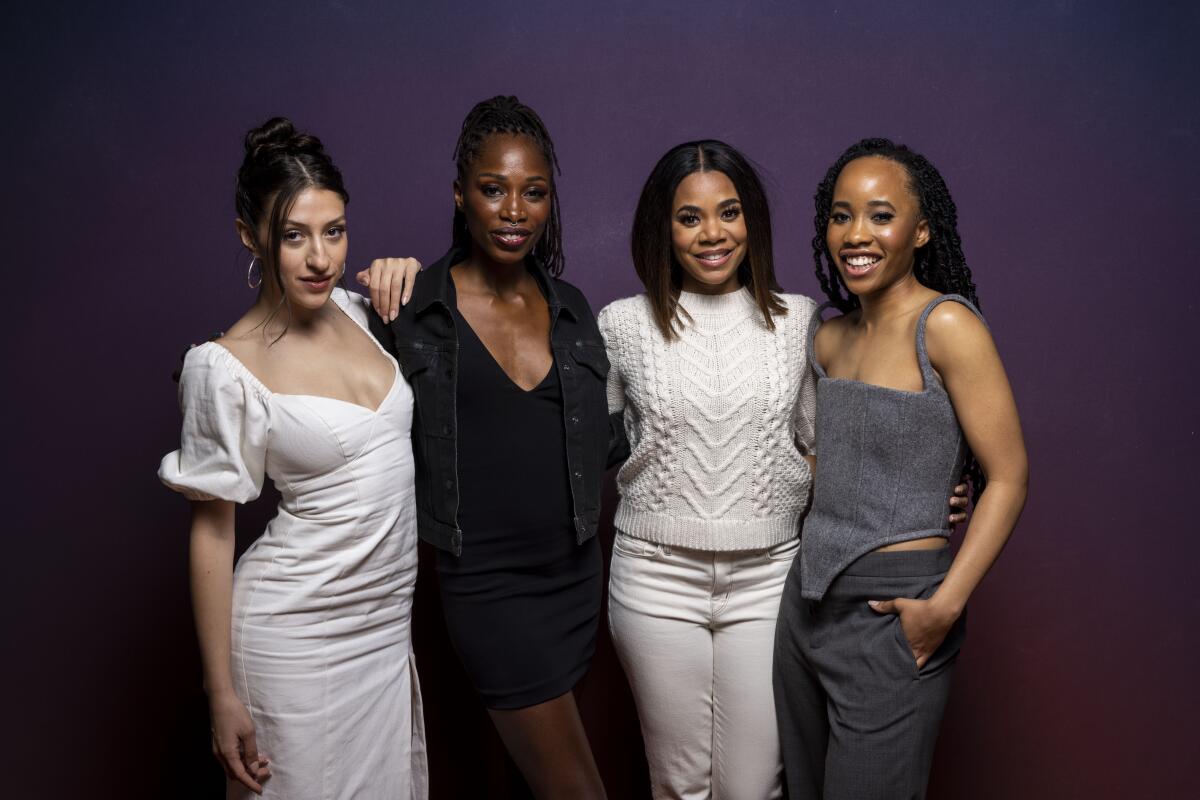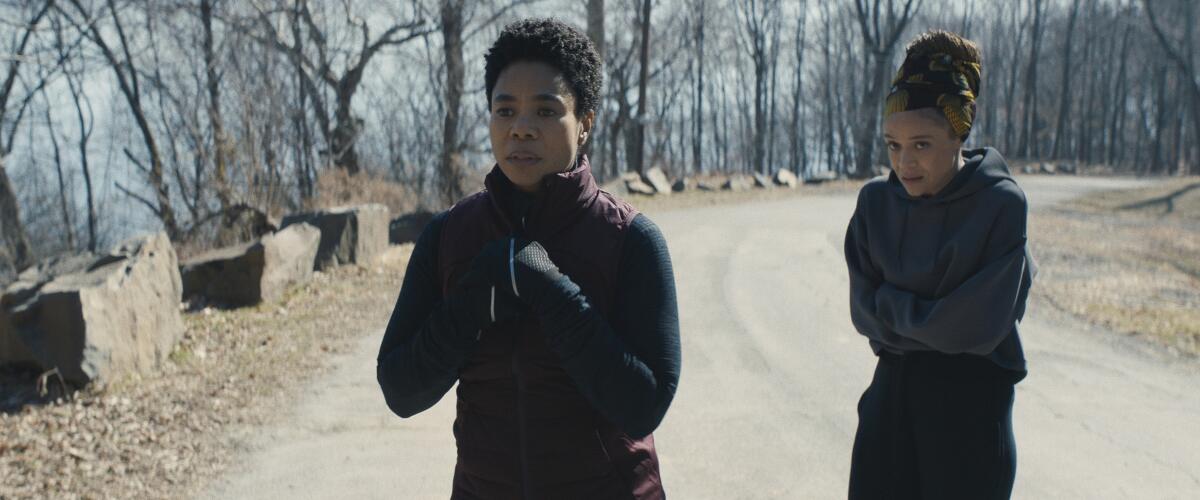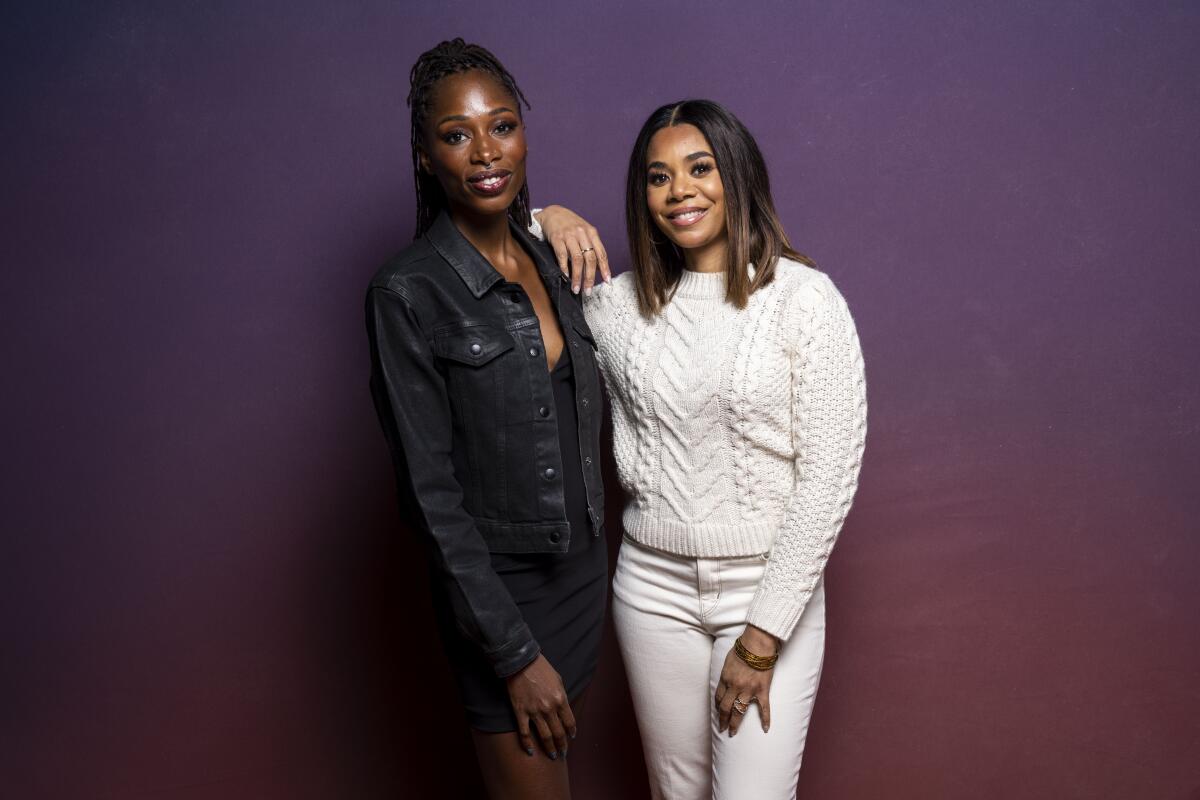Why racism is the real horror in Regina Hall’s college-set thriller ‘Master’

For filmmaker Mariama Diallo, writing “Master,” a “spooky drama” about Black women navigating the politics at a tony New England college, was a way of excising the microaggressions and racism she’d suppressed during her undergraduate years at Yale.
“I had some similar experiences to the ones you see in the film and I had a lot to unpack and process from that time,” she said. “It was kind of screaming at me to be told.”
Her debut feature, which premiered at Sundance and will be available in select theaters and on Prime Video Friday, stars Regina Hall as Professor Gail Bishop, the first Black woman to hold the titular post at Ancaster College, an elite Northeastern institution.
“The master position is one that I lifted from my own experience at Yale,” said Diallo. “It’s almost like a dean of students, but there are several of them tied to specific residence halls. It was alarmingly normalized to the students in a way that, in retrospect, was almost abusive. You’re inculcated into this system where you’re given a master and before you know it, you’re calling somebody ‘master’ and heading over to the Master’s House to ask them for advice. And that does trickle into your consciousness in one way or another, no matter how the school might try to explain away the origins of the term.”

The story is deeply personal for Diallo, whose mother is a retired academic who spent her entire professional career battling similar struggles to Gail. “I always knew I wanted to follow a Black woman who has been promoted into this role and is grappling with everything that that means,” she said. “What I always found compelling about it was the obvious contradiction of a Black woman being named master, thinking back to the historical sense of the word in this country.”
The film splits its narrative between the perspectives of Gail and Jasmine Moore (“Jinn” breakout Zoe Renee), an optimistic freshman who quickly finds herself the target of subtle and not-so-subtle racism coming at her from all angles: her fellow students, school staff and even the ghost of a Salem-era witch rumored to make students suicidal.
“I think that my experience was in many ways similar to Jasmine’s,” said Diallo. “I’ve kind of almost, perhaps for my own emotional purposes, held Jasmine at arm’s length a little bit and distanced myself from her, saying ‘Well Jasmine is fictional and her experience was so much worse than mine.’ Sort of ‘That’s Jasmine’s problem, I’m good.’
“Making this film and even just to talk about it now is this evolving process of learning more about myself,” she added. “On the most micro, textual level, my experience was really similar to Jasmine’s: The world that she’s living in and some of the darts that are constantly thrown at her are things that I experienced as an undergraduate as well. But I think that what I did, which we see Jasmine try to do, is turn down the noise of that level of racism because it would’ve been impossible to finish had I allowed myself to feel everything that was coming towards me. I made a kind of shield that I realize still exists around me in part to this day. So I really just needed to go back through my history and to excavate all of those memories.”

Diallo began imagining Hall for the role of Gail after seeing her dramatic turn in 2018’s “Support the Girls.”
“I was holding out hope for so long that we would be able to get her because I think that beyond a horror, ‘Master’ is kind of balancing a lot of different tones,” said Diallo. “And I had always known Regina to be a very flexible actor and really multitalented. She’s a natural comedian but she’s also such a gifted dramatic actress. I hadn’t seen her in a horror film, but I suspected that she would be able to pull that off as well.”
She wrote Hall a letter outlining why she’d be perfect for the role and sent it over with a copy of the script. Hall’s agents responded three days later to set up a meeting. “I thought the way she was able to tackle themes like race in the horror genre with the backdrop of elite academia was really smart and timely and very well done,” said the actor. “Mariama is so smart. She had such a vision for her film.”
“At its core, it really is the story of the characters,” said Diallo. “It’s about their experiences and evolution over the course of the film.”
The first draft of the script was told entirely from Gail’s point of view. “The events of the film are basically the same except our access to Jasmine was much more limited,” said Diallo. “We really only experienced Jasmine through Gail’s eyes.”
Since Gail could only plausibly come into contact with Jasmine a few times over the course of the film, Diallo’s Animal Kingdom producers Joshua Astrachan and Brad Becker-Parton leaned on her to incorporate more of the character’s experiences and inner world. “Every draft they’d be asking for more Jasmine,” she said. “And I was like, ‘Yeah but how many more encounters can I contrive between these two characters?’”
The idea to split the narrative came as something of a lightbulb moment. “I was running against a wall that did not need to exist,” said Diallo. “I kind of paused and realized, ‘Oh, I can just follow Jasmine on her own,’ which is a tiny bit unorthodox. But when I realized that, it really opened up a lot of possibilities for me because I started thinking about the generational differences between Gail and Jasmine and seeing her try to pass that [wisdom] to somebody else and the failures of some of those lessons.”

Like Jasmine, Gail’s way of dealing with the difficulties of her situation are to avoid them by adopting a nonconfrontational attitude. This way of coping comes in sharp relief to outspoken professor Liv Beckman (Amber Gray), Gail’s friend who is currently up for tenure.
“We see Gail, Jasmine and Liv all take different approaches to how they’re dealing with being in this space and how they’re trying to navigate their friends and colleagues,” said Diallo. “They’re all representing different facets of the way that a person might try to move in such a hostile space: We have Jasmine who’s in denial for so much of the film. She really doesn’t want to acknowledge what’s going on around her because it’s just too difficult, which feels close in a lot of respects to my own experience.
“And then Gail is optimistic to a fault, self-denying and just trying to forge through,” she added. “She’s got this Obama-era hopefulness of coming in and shaking up the system and moving the school away from some aspects of its history and its past. But I think that what Gail discovers as the film goes on is that that was not at all the school’s intention in hiring her and that is not the role that she’s actually meant to play.”
“Part of her identity is invested in being a success and in proving not just to herself but to a larger society, ‘Hey, Black women can be masters, we can do this,’” said Hall. “She put a lot into her education, into an academic life, into achievement. It probably took a long time to become a master: being tenured, writing published works. It’s not an easy journey.”
“She’s got this real belief in herself as one person who can drag everything [forward],” said Diallo. “Which is admirable, but when you’re dealing with an institution as wealthy, powerful and established as Ancaster, you need the collaboration of the institution itself to truly be able to move forward. It’s a Sisyphean task and it’s not going to happen that way.
“And then there’s someone like Liv, who is more active in some senses than Gail and Jasmine and is more readily combative in pushing back against the institution,” she added. “But she’s also managing and deploying her identity in ways that she understands the institution both values and is fearful of. They’re all taking these different strategies and none of them quite work because the forces that they’re up against are just so great.”
“Liv takes advantage of their need to diversify because she has her own agenda,” said Hall. “Gail goes in there probably believing that she’s making a change and Jasmine is the result of that oppressive culture. She can’t quite find her footing. She’s really trying to fit in and be like everyone else, but the reality of what’s going on around her — that with the haunting, whether that’s real or symbolic — it does seem to seep into [her emotional world].”

The resultant film, with its themes of both suppression and oppression, feels chokingly claustrophobic. “I think just setting it inside that world of Ancaster College, it felt like there was no way out,” said Hall. “Gail didn’t feel like she had a way out, Liv didn’t feel like she had a way out and Jasmine definitely didn’t feel like she had a way out. Even the people in the village, they felt kind of suppressed. Everything felt suppressed. It didn’t really feel like anyone’s voice was being heard or even being stated. You never really felt Gail really assert her voice. There was a lot of physical and emotional isolation in the movie.”
“I’ve heard back from many, many Black people — Black women in particular — who have been in some of these similar spaces and institutions and they’ve remarked how true it feels to their experience and how validating and even surprising it is to see it represented onscreen in a way that it hasn’t before,” said Diallo. “People of all different races have told me they’ve seen commonalities between the characters and their own experiences of isolation in certain spaces. That’s been really cheering to me.”
More to Read
Only good movies
Get the Indie Focus newsletter, Mark Olsen's weekly guide to the world of cinema.
You may occasionally receive promotional content from the Los Angeles Times.











